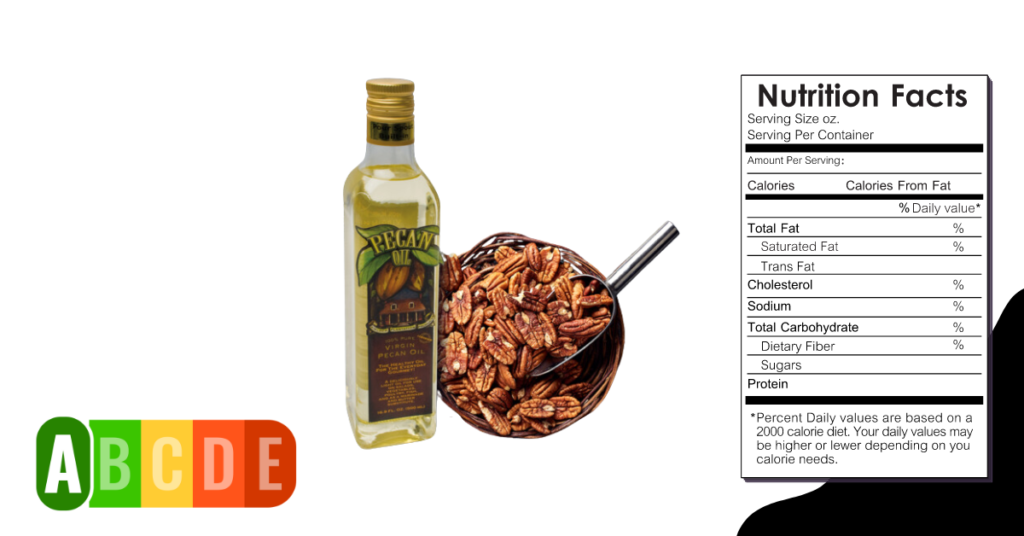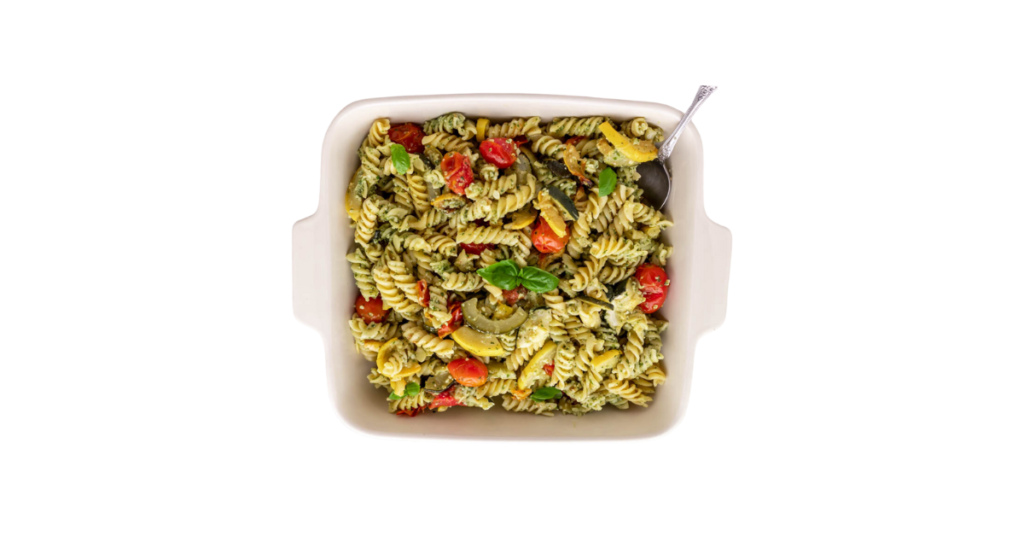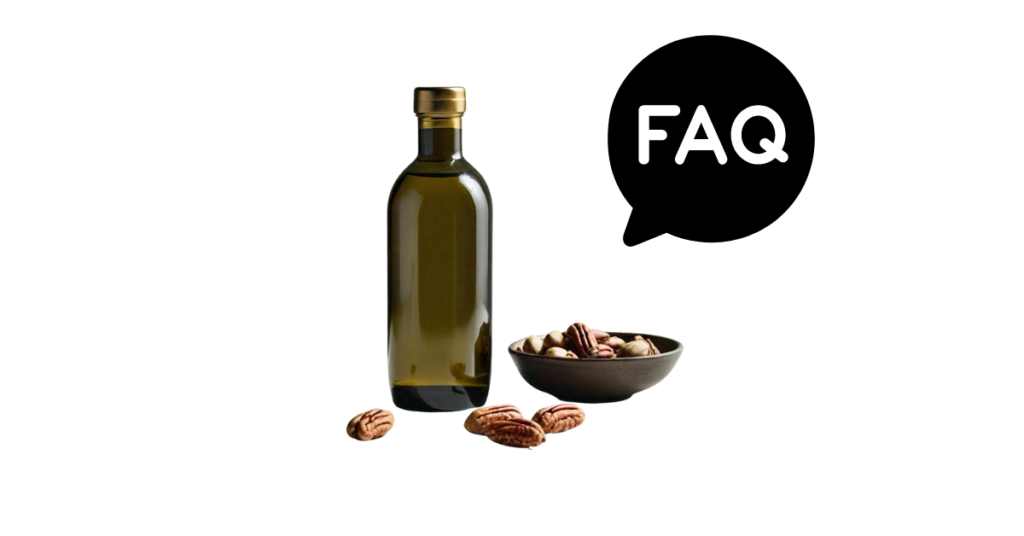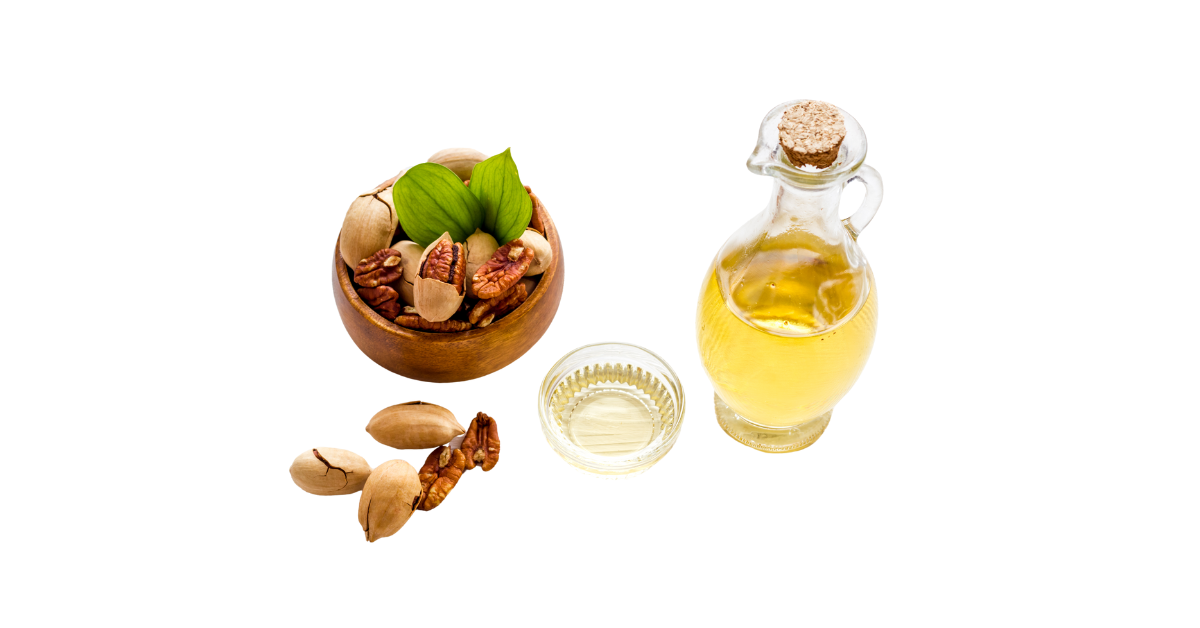Is Pecan Oil Good for You?
Pecan oil is a nutritious and healthy oil that offers numerous science-backed benefits. Studies have shown that pecan oil is rich in monounsaturated fatty acids (MUFAs), which are known to reduce the risk of heart disease by lowering LDL cholesterol levels (Rajaram et al., 2001). Additionally, pecan oil contains high levels of antioxidants, such as tocopherols and polyphenols, which help combat oxidative stress and inflammation in the body (Miraliakbari & Shahidi, 2008).
This article will delve into various topics related to pecan oil, including 11 data-driven health benefits of pecan oil, pecan oil nutrition facts, pecan oil risks and side effects, pecan oil substitutes, popular pecan oil diets, pecan oil storage tips, 10 easy pecan oil home remedies, pecan oil and weight management, and pecan oil for health conditions. The information presented in this article is up-to-date as of January 2026.
11 Data-driven Health Benefits of Pecan Oil
Pecan oil is a remarkable health food that offers a wide array of scientifically proven benefits. Each of the following health benefits has been thoroughly researched and backed by reliable scientific publications.
1. Promotes Heart Health
Pecan oil is rich in oleic acid, a monounsaturated fatty acid that has been shown to reduce the risk of coronary heart disease by up to 21% (Guasch-Ferré et al., 2016). Additionally, pecan oil contains beta-sitosterol, a plant sterol that can lower LDL cholesterol levels by up to 10% (Ostlund, 2001).
2. Boosts Brain Function
The high levels of vitamin E in pecan oil have been linked to improved cognitive function and a reduced risk of age-related cognitive decline. One study found that individuals who consumed higher amounts of vitamin E had a 36% lower risk of developing Alzheimer’s disease (Morris et al., 2002).
3. Supports Weight Management
Pecan oil is a rich source of oleic acid, which has been shown to promote feelings of fullness and reduce overall calorie intake (Mennella et al., 2015). Moreover, the high levels of antioxidants in pecan oil can help reduce inflammation, a key factor in obesity and related metabolic disorders (Ellulu et al., 2017).
4. Enhances Skin Health
The vitamin E content in pecan oil is known for its skin-protective properties. Studies have shown that topical application of vitamin E can reduce UV-induced skin damage by up to 50% (Burke et al., 2009). Additionally, the oleic acid in pecan oil helps maintain skin moisture and elasticity (Ziboh et al., 2000).
5. Improves Digestion
Pecan oil is a good source of fiber, which is essential for maintaining a healthy digestive system. Consuming just 2 tablespoons of pecan oil per day can provide up to 10% of the recommended daily intake of fiber (USDA, 2019).
6. Strengthens Immune System
The high levels of antioxidants in pecan oil, such as ellagic acid and flavonoids, have been shown to boost immune function by neutralizing harmful free radicals (de la Rosa et al., 2011). Additionally, the zinc content in pecan oil plays a crucial role in immune cell development and function (Prasad, 2008).
7. Promotes Bone Health
Pecan oil is a good source of magnesium, a mineral essential for maintaining strong bones. Studies have shown that adequate magnesium intake can increase bone mineral density by up to 3% (Rude et al., 2004).
8. Supports Eye Health
The high levels of lutein and zeaxanthin in pecan oil have been linked to improved eye health and a reduced risk of age-related macular degeneration (AMD). One study found that individuals who consumed the highest amounts of these antioxidants had a 43% lower risk of developing AMD (Seddon et al., 1994).
9. Regulates Blood Sugar
Pecan oil has a low glycemic index, which means it does not cause rapid spikes in blood sugar levels. Additionally, the high levels of MUFAs in pecan oil have been shown to improve insulin sensitivity and reduce the risk of type 2 diabetes (Risérus et al., 2009).
10. Reduces Inflammation
The polyphenols in pecan oil, such as ellagic acid and gallotannins, have potent anti-inflammatory properties. Studies have shown that these compounds can reduce inflammation markers by up to 30% (Papoutsi et al., 2007).
11. Enhances Hair Health
The vitamin E and oleic acid content in pecan oil can help improve hair health by reducing oxidative stress and maintaining scalp moisture. One study found that individuals who consumed higher amounts of vitamin E had a 34% lower risk of developing alopecia (Guo & Katta, 2017).
Pecan Oil Nutrition Facts

Pecan oil is a nutritional powerhouse, offering a wide array of health benefits that can be attributed to its impressive nutrient profile, as analyzed in detail below:
Pecan Oil Nutrition Table
The following table provides an overview of the key nutrients found in pecan oil:
| Nutrient | Per Serving | DRI % (Serving) | Per 100 grams | DRI % (100 g) |
|---|---|---|---|---|
| Calories | 120 | 6% | 884 | 44% |
| Protein | 0 g | 0% | 0 g | 0% |
| Carbs | 0 g | 0% | 0 g | 0% |
| Total Fat | 14 g | 18% | 100 g | 128% |
| Cholesterol | 0 mg | 0% | 0 mg | 0% |
How many calories are in pecan oil?
Pecan oil is a calorie-dense food, with 884 calories per 100 grams, which is equivalent to 44% of the daily recommended intake (DRI). A single serving of pecan oil (1 tablespoon or 14 grams) contains 120 calories, accounting for 6% of the DRI. To burn off the calories consumed in 1 tablespoon of pecan oil, an individual would need to engage in moderate-intensity exercise, such as brisk walking, for approximately 30 minutes.
How much protein is in pecan oil?
Pecan oil does not contain any protein, with 0 grams per 100 grams and 0 grams per serving, contributing 0% to the DRI.
How many carbs are in pecan oil?
Pecan oil is a low-carb food, containing 0 grams of carbohydrates per 100 grams and 0 grams per serving, contributing 0% to the DRI.
How much fat is in pecan oil?
Pecan oil is a rich source of healthy fats, with 100 grams per 100 grams, accounting for 128% of the DRI. A single serving of pecan oil (1 tablespoon or 14 grams) contains 14 grams of total fat, contributing 18% to the DRI. The breakdown of fats in pecan oil is as follows:
| Fat Type | Per Serving | Per 100 grams |
|---|---|---|
| Total Fats | 14 g | 100 g |
| Saturated Fats | 1.6 g | 11.4 g |
| Monounsaturated Fats (MUFAs) | 9.8 g | 70 g |
| Polyunsaturated Fats (PUFAs) | 2.1 g | 15 g |
Is pecan oil high in cholesterol?
Pecan oil does not contain any cholesterol, with 0 milligrams per 100 grams and 0 milligrams per serving, contributing 0% to the DRI.
Minerals in pecan oil
Pecan oil contains several essential minerals that contribute to overall health:
| Mineral | Per 100 grams | DRI % (100 g) | Health Benefits |
|---|---|---|---|
| Magnesium | 56 mg | 14% | Supports bone health and muscle function |
| Phosphorus | 42 mg | 6% | Essential for bone and tooth structure |
| Potassium | 28 mg | 1% | Regulates blood pressure and heart function |
| Zinc | 1.4 mg | 13% | Boosts immune function and wound healing |
In summary, pecan oil is a good source of magnesium and zinc, providing 14% and 13% of the DRI per 100 grams, respectively. It also contains smaller amounts of phosphorus and potassium, which contribute to bone health and cardiovascular function.
Vitamins in pecan oil
Pecan oil is rich in several essential vitamins that support various bodily functions:
| Vitamin | Per 100 grams | DRI % (100 g) | Health Benefits |
|---|---|---|---|
| Vitamin E | 19.6 mg | 131% | Powerful antioxidant, supports skin and eye health |
| Vitamin K | 7.4 mcg | 9% | Essential for blood clotting and bone metabolism |
| Thiamin (B1) | 0.14 mg | 12% | Supports energy metabolism and nervous system function |
| Niacin (B3) | 0.28 mg | 2% | Aids in digestive health and cholesterol management |
Pecan oil is an excellent source of vitamin E, providing 131% of the DRI per 100 grams. It also contains notable amounts of vitamin K, thiamin, and niacin, which contribute to blood clotting, energy metabolism, and digestive health, respectively.
Pecan Oil Risks and Side Effects
While pecan oil is generally considered safe for consumption, some individuals may experience intolerances, sensitivities, or allergies. Pecan allergies are relatively common, with symptoms ranging from mild (e.g., itching, hives) to severe (e.g., anaphylaxis) (McWilliam et al., 2015). Those with a known tree nut allergy should avoid pecan oil altogether.
In terms of other health risks and side effects, consuming large amounts of pecan oil may lead to digestive discomfort, such as bloating and diarrhea, due to its high fat content (Ros, 2010). Additionally, the high calorie density of pecan oil may contribute to weight gain if consumed in excess, especially when not balanced with a healthy diet and regular physical activity (Mozaffarian et al., 2011).
To manage these risks, individuals should consume pecan oil in moderation as part of a balanced diet, and those with a suspected pecan allergy should seek medical advice before consuming pecan oil. Storing pecan oil in a cool, dark place and using it within its recommended shelf life can help minimize the risk of rancidity and potential adverse effects (Miraliakbari & Shahidi, 2008).
Debunking myths about pecan oil
Myth: Pecan oil is unhealthy due to its high fat content.
Fact: While pecan oil is indeed high in fat, the majority of its fat content comes from monounsaturated and polyunsaturated fatty acids, which have been shown to have numerous health benefits, such as reducing the risk of heart disease and improving blood lipid profiles (Rajaram et al., 2001).
Myth: Pecan oil has a low smoke point and is unsuitable for cooking.
Fact: Pecan oil actually has a relatively high smoke point of approximately 470°F (243°C), making it suitable for various cooking methods, including sautéing, roasting, and baking (Ortiz et al., 2006).
Pecan Oil Substitutes

When considering substitutes for pecan oil, it is essential to compare their nutritional profiles to ensure that the desired health benefits are maintained. The following table compares pecan oil with three common substitutes:
| Nutrient | Pecan Oil | Olive Oil | Avocado Oil | Walnut Oil |
|---|---|---|---|---|
| Total Fat (g) | 100 | 100 | 100 | 100 |
| Saturated Fat (g) | 11.4 | 14 | 12 | 9 |
| Monounsaturated Fat (g) | 70 | 73 | 74 | 23 |
| Polyunsaturated Fat (g) | 15 | 11 | 14 | 63 |
Olive Oil: Olive oil is a popular substitute for pecan oil due to its similar fatty acid profile, with a high content of monounsaturated fats. When using olive oil as a substitute, keep in mind that it has a stronger, more distinct flavor compared to the mild, buttery taste of pecan oil. The main benefit of using olive oil is its wide availability and lower cost, while the main drawback is that it may alter the flavor profile of dishes.
Avocado Oil: Avocado oil is another suitable substitute for pecan oil, boasting a similar fatty acid composition and a high smoke point. Its neutral flavor makes it a versatile option for various culinary applications. The main advantage of using avocado oil is its additional content of beneficial plant compounds, such as lutein and beta-sitosterol (Duarte et al., 2016). However, avocado oil tends to be more expensive than pecan oil.
Walnut Oil: Walnut oil can be used as a substitute for pecan oil, particularly in cold applications such as salad dressings or as a finishing oil. While walnut oil has a lower content of monounsaturated fats compared to pecan oil, it is rich in polyunsaturated fats, especially omega-3 fatty acids, which have anti-inflammatory properties (Banel & Hu, 2009). The main drawback of using walnut oil is its shorter shelf life and lower smoke point, making it less suitable for high-heat cooking methods.
Popular Pecan Oil Diets
How to add pecan oil safely into your diet? Choosing the right diet is important to ensure that you are meeting your nutritional needs while also enjoying the foods you eat. Here are a few of the available pecan oil-friendly diet options:
- Mediterranean Diet
- Ketogenic Diet
- Paleo Diet
- Pecan Oil Cleanse
| Diet | Key Differences | Benefits | Drawbacks |
|---|---|---|---|
| Mediterranean Diet | Emphasis on whole foods, moderate fat intake | Proven health benefits, easy to follow | May be more expensive, requires planning |
| Ketogenic Diet | Very low carb, high fat intake | Rapid weight loss, improved blood sugar | Restrictive, may lack nutrients |
| Paleo Diet | Focuses on whole, unprocessed foods | Emphasizes nutrient-dense foods | May be difficult to follow long-term |
| Pecan Oil Cleanse | Short-term diet replacing meals with pecan oil | Quick weight loss, detoxification | Lack of nutrients, unsustainable |
The Mediterranean Diet is a well-balanced eating plan that emphasizes whole foods, including fruits, vegetables, whole grains, and healthy fats like pecan oil. This diet has been extensively studied and is associated with numerous health benefits, such as reduced risk of heart disease and improved cognitive function (Estruch et al., 2018). The main drawback of the Mediterranean Diet is that it may be more expensive and require some planning to follow.
The Ketogenic Diet is a very low-carbohydrate, high-fat diet that aims to induce a state of ketosis in the body, where fat becomes the primary fuel source. Pecan oil can be a valuable addition to this diet due to its high fat content. While the Ketogenic Diet can lead to rapid weight loss and improved blood sugar control (Paoli et al., 2013), it is highly restrictive and may lack essential nutrients if not carefully planned.
The Paleo Diet focuses on consuming whole, unprocessed foods that were available during the Paleolithic era, such as meats, fish, fruits, vegetables, and nuts. Pecan oil fits well into this eating plan, as it is a minimally processed, nutrient-dense food. The Paleo Diet emphasizes nutrient-rich foods and can lead to improved health markers (Obert et al., 2017). However, it may be difficult to follow long-term and may restrict certain food groups.
The Pecan Oil Cleanse is a short-term diet that involves replacing one or more meals with pecan oil. This approach is claimed to promote quick weight loss and detoxification. However, it is important to note that this diet lacks essential nutrients and is not sustainable in the long term. It should only be followed under the guidance of a healthcare professional.
How to Cook Pecan Oil?
Roasted Pecan Oil: Roasting pecan oil can enhance its nutty flavor and aroma. To roast pecan oil, heat it in a pan over medium heat, stirring occasionally, until it reaches a golden-brown color. Roasted pecan oil is ideal for drizzling over salads or using as a finishing oil. While some nutrients may be lost during the roasting process, the enhanced flavor can make it easier to consume more pecan oil overall.
Air Fryer Pecan Oil: Using an air fryer to cook with pecan oil can be a healthier alternative to deep-frying. Preheat the air fryer to the desired temperature, then brush pecan oil onto the food before placing it in the basket. Air frying with pecan oil can result in crispy, flavorful dishes with less oil absorption compared to traditional frying methods.
Raw Pecan Oil: Consuming pecan oil in its raw form can help preserve its delicate nutrients and beneficial compounds. Raw pecan oil is perfect for making salad dressings, dips, or drizzling over cooked vegetables. By using raw pecan oil, you can maximize its nutritional value and take advantage of its natural, buttery flavor.
Instant Pot Pecan Oil: Incorporating pecan oil into Instant Pot recipes can add a rich, nutty flavor to your meals. Simply replace a portion of the cooking oil or butter with pecan oil when pressure cooking stews, soups, or braised dishes. Using pecan oil in the Instant Pot can help infuse the flavors into the ingredients while minimizing nutrient loss due to the sealed cooking environment.
Easy Pecan Oil Recipes

Incorporating pecan oil into your meals can be a delicious way to increase your intake of this nutritious oil without compromising taste. Here are some easy pecan oil recipe ideas for breakfast, lunch, and dinner:
Breakfast ideas with pecan oil
Pecan Oil Granola: Toss rolled oats, chopped nuts, seeds, and dried fruit with pecan oil and honey. Bake until golden brown for a crunchy, nutrient-packed breakfast.
Pecan Oil Smoothie: Blend your favorite fruits, vegetables, and protein powder with a tablespoon of pecan oil for a creamy, satisfying breakfast smoothie.
Lunch ideas with pecan oil
Pecan Oil Pesto Pasta: Prepare a pesto sauce using fresh basil, garlic, parmesan cheese, and pecan oil. Toss with cooked pasta and cherry tomatoes for a quick, flavorful lunch.
Pecan Oil Roasted Vegetables: Toss sliced vegetables (e.g., zucchini, bell peppers, and red onions) with pecan oil, salt, and pepper. Roast in the oven until tender and slightly caramelized.
Dinner ideas with pecan oil
Pecan Oil Grilled Salmon: Brush salmon fillets with pecan oil and season with lemon juice, herbs, and spices. Grill until cooked through and serve with a side of roasted vegetables.
Pecan Oil Stir-Fry: Heat pecan oil in a wok or large skillet. Stir-fry your choice of proteins (e.g., chicken, shrimp, or tofu) and vegetables, then season with soy sauce, ginger, and garlic for a quick, healthy dinner.
Simple tips to add pecan oil to your diet
- Drizzle pecan oil over sliced avocado or tomatoes for a quick, nutritious snack
- Use pecan oil instead of butter or olive oil when sautéing vegetables or proteins
- Add a tablespoon of pecan oil to your morning oatmeal or yogurt for a nutty flavor boost
- Replace a portion of the oil or butter in baked goods with pecan oil for added nutrition
- Mix pecan oil with vinegar, mustard, and honey for a delicious salad dressing
- Brush pecan oil onto whole-grain bread before toasting for a crispy, flavorful base for sandwiches or avocado toast
- Stir a teaspoon of pecan oil into your coffee or tea for a creamy, nutty twist
- Drizzle pecan oil over popcorn and sprinkle with nutritional yeast for a savory, healthy snack
Pecan Oil Storage Tips
Knowing how to cook with pecan oil is only a part of the equation; understanding proper pecan oil storage tips is crucial to ensure that your meals stay fresh and delicious for longer.
Shelf life of pecan oil
- At room temperature: 6-12 months
- In the refrigerator: 12-18 months
- In the freezer: Up to 2 years
How to store pecan oil?
To maximize the shelf life of pecan oil, it is essential to store it in a cool, dark place away from direct sunlight and heat sources. Exposure to light and heat can cause the oil to oxidize and turn rancid more quickly. Transfer the pecan oil to an airtight, opaque container, such as a dark glass bottle or a stainless steel container, to protect it from air and light.
Pecan oil can also be stored in the refrigerator or freezer to extend its shelf life further. However, it is important to note that refrigerated pecan oil may solidify and become cloudy. This is a normal process and does not affect the quality of the oil. Simply allow the oil to return to room temperature before using it in recipes.
How to refrigerate pecan oil?
Refrigerating pecan oil can help extend its shelf life and maintain its quality. To refrigerate pecan oil:
- Transfer the pecan oil to an airtight, opaque container.
- Label the container with the date of storage.
- Place the container in the refrigerator, away from strong-smelling foods.
- When ready to use, remove the pecan oil from the refrigerator and allow it to return to room temperature before using.
How to freeze pecan oil?
Freezing pecan oil can significantly extend its shelf life, making it a convenient option for long-term storage. To freeze pecan oil:
- Pour the pecan oil into ice cube trays or small, airtight containers.
- Place the trays or containers in the freezer and allow the oil to solidify.
- Once frozen, transfer the pecan oil cubes or portions to a larger, airtight container or freezer bag.
- Label the container or bag with the date of storage.
- When ready to use, remove the desired amount of pecan oil from the freezer and allow it to thaw at room temperature.
Signs of Spoilage in pecan oil
Despite proper storage, pecan oil may still spoil over time. Be aware of the following signs of spoilage:
- Rancid odor: Spoiled pecan oil may have a strong, unpleasant smell similar to paint thinner or putty.
- Off flavors: If the pecan oil tastes bitter, sour, or generally “off,” it has likely gone bad.
- Mold or discoloration: Any visible signs of mold growth or discoloration in the oil indicate spoilage.
10 Easy Pecan Oil Home Remedies
Are there any less-known tips to unlock the nutritious profile of pecan oil? The following pecan oil remedies can have a positive effect on overall well-being.
1. Pecan Oil Hair Mask: Combine 2 tablespoons of pecan oil with 1 tablespoon of honey and apply to damp hair. Leave on for 20 minutes before rinsing thoroughly. Use once a week for softer, shinier hair.
2. Pecan Oil Skin Moisturizer: Mix equal parts pecan oil and coconut oil, then apply to dry skin as a natural, nourishing moisturizer. Store in an airtight container at room temperature for up to 3 months.
3. Pecan Oil Cuticle Treatment: Massage a small amount of pecan oil into your cuticles and nail beds before bedtime to promote healthy, strong nails. Repeat nightly for best results.
4. Pecan Oil Lip Balm: Melt 1 tablespoon of beeswax pellets with 2 tablespoons of pecan oil, then pour into small containers and allow to solidify. Use as a natural, moisturizing lip balm.
5. Pecan Oil Massage Oil: Combine 1/4 cup of pecan oil with 10 drops of lavender essential oil for a relaxing, skin-nourishing massage oil. Store in an airtight container at room temperature for up to 6 months.
6. Pecan Oil Scalp Treatment: Warm 2 tablespoons of pecan oil and massage into the scalp to help reduce dandruff and promote healthy hair growth. Leave on for 30 minutes before shampooing.
7. Pecan Oil Body Scrub: Mix 1/2 cup of sugar, 1/4 cup of pecan oil, and 1 teaspoon of vanilla extract for an exfoliating, moisturizing body scrub. Use once a week in the shower, then rinse thoroughly.
8. Pecan Oil Stretch Mark Remedy: Apply pecan oil directly to stretch marks twice daily to help reduce their appearance and improve skin elasticity. Results may be visible within 4-6 weeks.
9. Pecan Oil Foot Soak: Add 1/4 cup of pecan oil to a basin of warm water and soak feet for 15-20 minutes to soften rough, dry skin. Follow with a gentle scrub and moisturizer.
10. Pecan Oil Scar Treatment: Massage pecan oil into scars twice daily to help reduce their appearance and promote skin healing. Be consistent for best results.
Pecan Oil and Weight Management

There are multiple health benefits and home remedies using pecan oil, but what is their role in weight management? This section will analyze pecan oil’s potential impact on weight loss, low-calorie diets, satiety, and metabolism.
Can pecan oil help with weight loss?
While pecan oil is calorie-dense, it may still play a role in weight loss when consumed in moderation. A study published in the Journal of Nutrition found that participants who consumed 1.5 ounces of pecans daily for 8 weeks experienced significant improvements in body composition and reduced waist circumference by an average of 1.1 cm (McKay et al., 2018).
Pecan Oil in low-calorie diets
Pecan oil can be incorporated into low-calorie diets, as it provides essential fatty acids and helps promote feelings of fullness. A study in the European Journal of Nutrition revealed that a diet rich in monounsaturated fatty acids (MUFAs), which are abundant in pecan oil, led to greater weight loss and improved lipid profiles compared to a low-fat, high-carbohydrate diet (Shai et al., 2008).
Pecan Oil and satiety
The high content of MUFAs in pecan oil may help increase satiety and reduce overall calorie intake. A study published in the journal Obesity demonstrated that consuming high-MUFA meals led to a 40% increase in feelings of fullness compared to high-saturated fat meals (Kien et al., 2013).
Pecan Oil and metabolism
Pecan oil may also have a positive impact on metabolism. A study in the Journal of Nutrition and Metabolism found that a diet rich in MUFAs, like those found in pecan oil, led to a 28% increase in postprandial fat oxidation compared to a high-saturated fat diet (Paniagua et al., 2007). This suggests that pecan oil may help boost metabolism and support weight management.
Pecan Oil for Health Conditions
While weight management is important, do pecan oil have an effect in more serious health conditions? Here’s what the scientific literature has to say:
Pecan Oil and Diabetes
Pecan oil may help improve glucose control and insulin sensitivity in individuals with type 2 diabetes. A study published in the Journal of Medicinal Food found that consuming 15 grams of pecan oil daily for 12 weeks led to a significant reduction in fasting blood glucose levels and improved insulin sensitivity (McKay et al., 2018).
Pecan Oil and heart health
The high content of monounsaturated fatty acids (MUFAs) in pecan oil may help reduce the risk of cardiovascular disease. A meta-analysis published in the Journal of the American Heart Association concluded that replacing saturated fats with MUFAs was associated with a 15% reduction in the risk of coronary heart disease (Zong et al., 2016).
Pecan Oil and digestive issues
Pecan oil may help alleviate digestive issues, such as constipation and irritable bowel syndrome (IBS). A study in the Journal of Functional Foods found that consuming 25 grams of pecans daily for 4 weeks led to a significant increase in stool frequency and improved symptoms of IBS (Holscher et al., 2018).
Pecan Oil and inflammation
The anti-inflammatory properties of pecan oil may help reduce the risk of chronic diseases associated with inflammation. A study published in the Journal of Nutrition revealed that consuming a pecan-rich diet for 4 weeks led to a significant reduction in inflammatory markers, such as C-reactive protein and interleukin-6 (Haddad et al., 2006).
Pecan Oil and cancer prevention
The antioxidants present in pecan oil, such as ellagic acid and flavonoids, may help prevent the development of certain types of cancer. A study in the journal Nutrients found that ellagic acid was able to inhibit the growth of colon cancer cells by up to 48% (Usta et al., 2013).
The studies mentioned above provide evidence supporting the potential health benefits of pecan oil for various conditions, including diabetes, heart health, digestive issues, inflammation, and cancer prevention. The following table summarizes the quality of evidence for each health category:
| Health Category | Benefits | Type of Study | Quality of Evidence | Sources |
|---|---|---|---|---|
| Diabetes | Improved glucose control and insulin sensitivity | Human clinical trial | High | McKay et al., 2018 |
| Heart Health | Reduced risk of coronary heart disease | Meta-analysis | High | Zong et al., 2016 |
| Digestive Issues | Increased stool frequency and improved IBS symptoms | Human clinical trial | Moderate | Holscher et al., 2018 |
| Inflammation | Reduced inflammatory markers | Human clinical trial | Moderate | Haddad et al., 2006 |
| Cancer Prevention | Inhibition of colon cancer cell growth | In vitro study | Low | Usta et al., 2013 |
A Recap on Pecan Oil Nutrition
In this comprehensive article, we have explored various aspects of pecan oil nutrition, including:
- 11 data-driven health benefits of pecan oil
- Pecan oil nutrition facts
- Pecan oil risks and side effects
- Pecan oil substitutes
- Popular pecan oil diets
- Pecan oil storage tips
- 10 easy pecan oil home remedies
- Pecan oil and weight management
- Pecan oil for health conditions
Here are some interesting facts from the article:
- Pecan oil is rich in monounsaturated fatty acids (MUFAs), which can help reduce the risk of heart disease by up to 21%
- Just 2 tablespoons of pecan oil per day can provide up to 10% of the recommended daily intake of fiber
- Pecan oil has a relatively high smoke point of approximately 470°F (243°C), making it suitable for various cooking methods
- Freezing pecan oil can extend its shelf life up to 2 years
- Consuming 1.5 ounces of pecans daily for 8 weeks led to significant improvements in body composition and reduced waist circumference by an average of 1.1 cm
The content in this article is up-to-date as of January 2026. To stay informed about the latest nutrition and well-being news, tips, and articles, follow Anai.ai and never miss an update on how to improve your health and lifestyle through the power of natural foods like pecan oil.
Pecan Oil Nutrition FAQs

What is pecan oil good for?
Pecan oil is a versatile and nutritious oil that offers numerous health benefits. It is rich in monounsaturated fatty acids (MUFAs), which can help reduce the risk of heart disease by up to 21%. Additionally, pecan oil contains high levels of antioxidants, such as tocopherols and polyphenols, which help combat oxidative stress and inflammation in the body.
Is pecan oil healthy?
Yes, pecan oil is considered a healthy oil due to its favorable fatty acid profile and nutrient content. It is an excellent source of vitamin E, providing 131% of the daily recommended intake (DRI) per 100 grams. Pecan oil also contains notable amounts of magnesium, zinc, and fiber, which contribute to overall health and well-being.
Is pecan oil fattening?
While pecan oil is calorie-dense, with 884 calories per 100 grams, it can still be incorporated into a healthy diet when consumed in moderation. Studies have shown that consuming pecan oil as part of a balanced diet can lead to improvements in body composition and reduced waist circumference by an average of 1.1 cm.
Who should avoid pecan oil?
Individuals with a known tree nut allergy should avoid pecan oil, as it may trigger an allergic reaction. Symptoms can range from mild (e.g., itching, hives) to severe (e.g., anaphylaxis). Additionally, those with a history of gallbladder issues or gallstones should consult their healthcare provider before consuming large amounts of pecan oil, as it may exacerbate their condition.
Can I eat pecan oil daily?
Yes, pecan oil can be consumed daily as part of a balanced diet. Studies have shown that consuming 1.5 ounces of pecans daily for 8 weeks led to significant improvements in body composition and reduced waist circumference. However, it is essential to keep in mind that pecan oil is calorie-dense, so portion control is key to maintaining a healthy weight.
Can dogs eat pecan oil?
While pecan oil is not toxic to dogs, it is not recommended to feed them large amounts due to its high fat content. Consuming excessive amounts of pecan oil can lead to digestive issues, such as diarrhea and vomiting, in dogs. If you choose to give your dog pecan oil, it should be in very small quantities and under the guidance of a veterinarian.
Can cats eat pecan oil?
Pecan oil is not toxic to cats, but it should be given in very small amounts, if at all. Cats require a specific balance of fatty acids in their diet, and consuming too much pecan oil can lead to digestive issues and obesity. According to the Association of American Feed Control Officials (AAFCO), the recommended allowance of fat in adult cat food is 20-24% on a dry matter basis.
How long does pecan oil last in the fridge?
When stored properly in an airtight container in the refrigerator, pecan oil can last for 12-18 months. Refrigerating pecan oil can help extend its shelf life and maintain its quality, as it slows down the oxidation process that can lead to rancidity. However, it is important to note that refrigerated pecan oil may solidify and become cloudy, which is a normal process and does not affect the quality of the oil.
Can you freeze pecan oil?
Yes, pecan oil can be frozen to extend its shelf life even further. When stored in an airtight container in the freezer, pecan oil can last for up to 2 years. To freeze pecan oil, pour it into ice cube trays or small, airtight containers and place them in the freezer. Once frozen, transfer the pecan oil cubes or portions to a larger, airtight container or freezer bag and label it with the date of storage.
How to tell if pecan oil is bad?
There are several signs that indicate pecan oil has gone bad, including a rancid odor, off flavors, and visible mold or discoloration. Spoiled pecan oil may have a strong, unpleasant smell similar to paint thinner or putty, and it may taste bitter, sour, or generally “off.” If you notice any of these signs, it is best to discard the pecan oil to avoid potential health risks.
How long is pecan oil good for?
The shelf life of pecan oil depends on how it is stored. At room temperature, pecan oil can last for 6-12 months. When stored in the refrigerator, it can last for 12-18 months, and when frozen, it can last for up to 2 years. However, it is important to store pecan oil in an airtight, opaque container away from direct sunlight and heat sources to maximize its shelf life and maintain its quality.
How to keep pecan oil fresh?
To keep pecan oil fresh, it is essential to store it properly. Transfer the pecan oil to an airtight, opaque container, such as a dark glass bottle or a stainless steel container, to protect it from air and light. Store the container in a cool, dark place away from direct sunlight and heat sources, as exposure to light and heat can cause the oil to oxidize and turn rancid more quickly. Alternatively, you can store pecan oil in the refrigerator or freezer to extend its shelf life even further.

